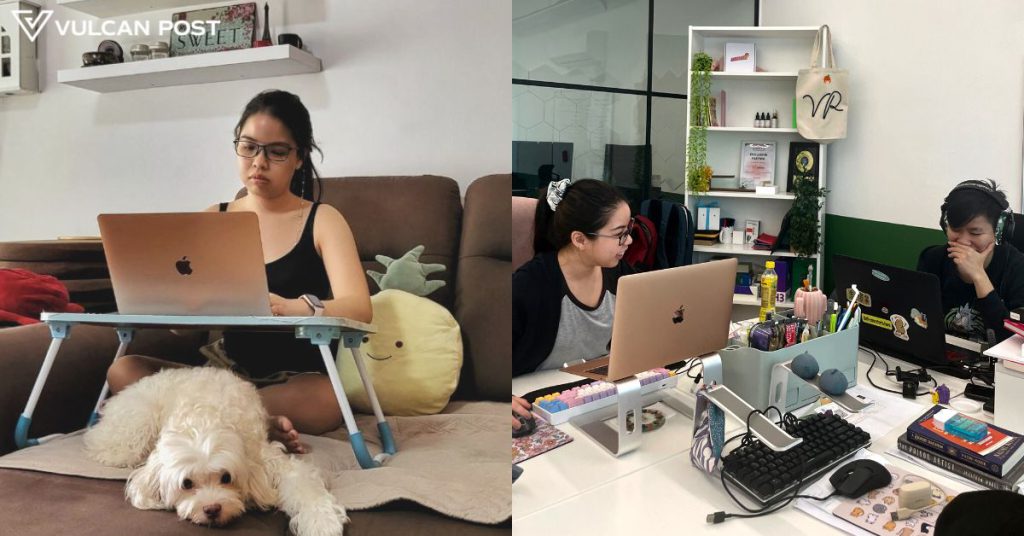By now, most of us have experienced remote work as a result of the pandemic.
There have been a lot of discussions about the effects, advantages, or shortcomings of remote work, so it’s no surprise working arrangements are one of the main focuses of Hiredly’s 2022 Work Culture Report.
The Malaysian job portal asked respondents to answer various questions regarding their work arrangements. Here’s what they had to say.
To each their own
According to the survey, 89% of remote workers enjoyed their arrangement, while 78% of on-site workers enjoyed working in the office.
As for hybrid workers, 86% enjoyed working remotely, while 74% enjoyed working in the office.
Those who work remotely enjoyed the fact that their arrangement helps them save time and cost while reducing commute stress.
Office workers, on the other hand, get to enjoy easier collaboration with team members, more readily available resources, and a better work-life balance.
While Hiredly’s report didn’t touch on the cons of each arrangement, it’s clear each option has its perks.
And yet, the “winner” seems to be clear.
Best of both worlds for both employees & employers
Hiredly asked the respondents for the working arrangements they preferred. Across the three categories of workers, a strong majority favoured the hybrid arrangement.
But why do employees want it? Perhaps it’s because they get both the perks of remote work and on-site work?

According to a Cisco report released earlier this year which includes Malaysian respondents, hybrid work has a positive effect on all areas of employee well-being, including emotional, financial, mental, physical, and social categories.
A sizable majority of employees (86.2%) claim to be happier with hybrid working arrangements. Similar to Hiredly’s report, the Cisco study also found that the majority of Malaysian respondents (73.5%) would like a hybrid arrangement.
Plus, working from home doesn’t seem to affect workplace relations. In Hiredly’s report, the majority of each group said there weren’t any changes when it came to relationships with peers and management.
With that said, though, a higher percentage of office workers felt more connected to their peers compared to hybrid and remote workers. Meanwhile, a higher percentage of remote workers felt more disconnected than the two other groups of employees.
Hybrid workers provided more moderate answers compared to the two other groups.
Preparing for hybrid work
While employees believe they benefit from it, here’s what employers get out of this arrangement.
According to the Cisco report, 59.7% of Malaysian respondents say their quality of work has improved with hybrid work. 55.1% answered that their productivity is up, too, while 61.3% said job knowledge and skills have increased.

At the same time, 33% of hybrid workers said they felt more connected to management, a higher percentage compared to on-site workers (22%).
In June, it was announced that employees in Malaysia can apply for Flexible Work Arrangements (FWA) with their employers under the amendment to the Employment Act 1955, which will come into force on September 1, 2022.
According to a Malay Mail article, Deputy Minister of Human Resources Datuk Awang Hashim said the FWA application must be made in writing and can cover changes in working hours, working days and also the place of work.
He also said the employer must give an answer back in writing to agree or reject the application within 60 days while giving reasons for the decision.
With FWA, perhaps hybrid work can be the future after all.
However, according to Cisco’s study, most Malaysians are still unsure if their organization is fully prepared for a hybrid working future.
A good place to start, perhaps, is by just jumping straight in.
Hiredly brought up a recent Harvard Business School study that found the best way for workers to stay productive is to spend only one or two days a week in the office.
As the job portal puts it, though, “At the end of the day, what matters is that your employees are comfortable at work, and it’s up to you to find a solution that meets the needs of both the company and the employee.”
- Learn more about Hiredly’s Work Culture Report 2022 here.
- Read other job-related articles we’ve written here.












